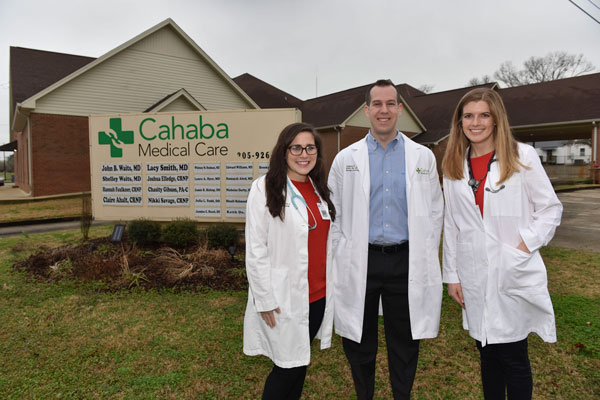As a 2017-18 ASF Fellow for Life, Meghan Pattison collaborated with United Way Help Me Grow and Success by Six to help connect parent caregivers of children with newly diagnosed developmental delays with necessary resources. By the end of her Fellowship year, both families’ wait time for referrals and follow-ups decreased and educational materials about connecting families with resources were created for nursing providers.
Now almost four years past the beginning of Meghan’s Fellowship year, the UAB School of Nursing graduate now works as a nurse practitioner at Christ Health Center. We recently spoke to Meghan about her work post-Fellowship and how she continues to provide patient care through a holistic lens.
Q: Where do you currently work and what is your current position?
A: I work at Christ Health Center in Woodlawn as a nurse practitioner. I see patients across the lifespan, majority of whom are uninsured or underinsured.
Q: What does your day-to-day work look like?
A: My day-to-day looks like caring for my patients. I see about 20 patients a day and care for not only their physical needs but try to address their mental, emotional and spiritual needs as well. This includes identifying social determinants of health that may be impacting their care. This includes brainstorming about how to reduce barriers to care and working with an interdisciplinary team to make that happen. I spend a lot of my time working with new nurse practitioners through a residency program. The nurse practitioner residents train with me for one year with the hope they will be better equipped to care for underserved populations for the rest of their careers.
Q: As a nurse practitioner, how has understanding the social determinants of health shown up in your work?
A: It truly affects everything I do. I could not care for my patients well if I was not factoring in social determinants. I can give great advice on diet or prescribe the best new diabetes medicine; but if you live in a food desert or don’t have transportation to the pharmacy, then the impact is limited. I have to see my patient as a whole person which includes understanding their life outside of the clinic.
Q: What type of impact does your Fellowship experience have on your current work?
A: I think one of the most impactful things about the Fellowship was a greater understanding of the various ways different disciplines and careers work together. I still find myself encouraged to know that there are people who share the same goals and vision that are doing the work on a daily basis. Doing this kind of work can feel lonely or lead to burnout so knowing there are people who have gone before you and working beside you is a source of great encouragement.
Q: Where do you see yourself in the next five to 10 years?
A: Honestly I want to keep doing exactly what I am doing but with a larger team of people. I want to be at Christ Health Center caring for my same patients but have a larger team of people doing the work with us so we can care even more holistically for our patients.
Q: Now that you’re in community health work full-time, is there anything you would change about how you approached the project?
A: Now that I work in primary care medicine and our practice cares for a lot of children I would love to see there be even more growth in the partnership with pediatricians. Pediatricians are working hard to screen and identify kids with developmental delays. This is especially relevant post-pandemic when we went so long without seeing many kids in the office. However, connecting kids with the resources they need is hard to say the least and the wait time can be really discouraging to both families and providers. I think the potential for partnership between United Way programs and local pediatricians should continue to grow so that once needs are identified they can work together to get kids the necessary services and interventions as quickly as possible.
Q: You finished your Fellowship almost four years ago. What lessons do you understand now more than you did in the past?
A: There are so many things that I knew in theory but had not gotten to experience in “the real world” yet. Most importantly, I understand the importance of empowering people more fully than I did before. I can have a multitude of great ideas about what I think my patients may need but ultimately the most impactful thing I can do is to give them the tools and resources they need to bring about change.
Q: What is a piece of advice you would give to prospective applicants for the 2022-23 class and/or our current 2021-22 Fellows?
A: I would encourage current Fellows to build connections with the people in your class. You never know how those connections could help you care for your patients in the future.




